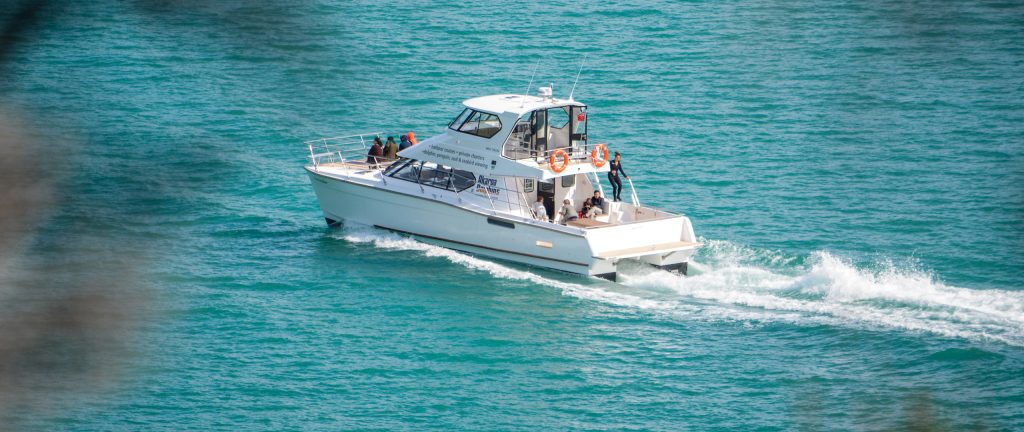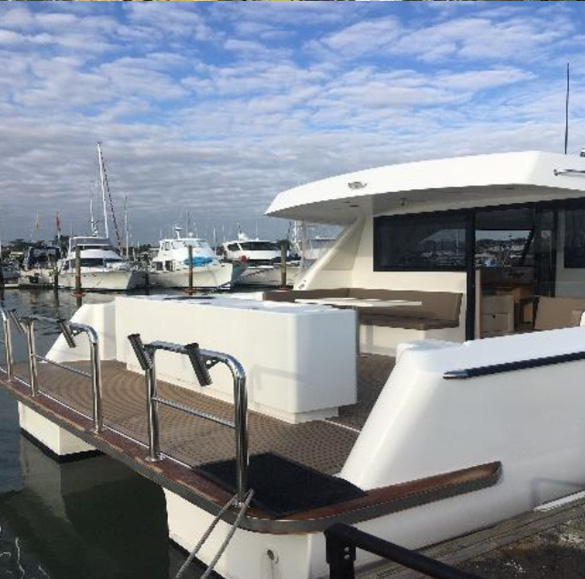
Outboard motors play a pivotal role in powering marine vessels across New Zealand’s waters. Among the key decisions facing Kiwi boaties is the choice between diesel and petrol outboard motors.
The best answer is… it depends! In this article, we look into the advantages and disadvantages of each option to help make your decision-making process clearer.

Diesel Outboards. Powerful. Efficient. Robust.
Fuel Efficiency
Diesel engines are known for their superior fuel efficiency compared to petrol alternatives. This efficiency translates to real cost savings over the long term.
Torque and Power
One of the standout features of diesel engines is their torque, especially at lower RPMs. This torque advantage is crucial in situations requiring substantial pulling power, such as towing boats to safety during emergencies.
Durability and Longevity
Diesel engines are also known for their robust construction and extended lifespan, when compared to petrol engines. The reliability and durability of diesel outboard motors have been well-documented worldwide.

Coastguard Mana Picks Diesel Power
Coastguard Mana (an affiliated unit of Coastguard New Zealand) is based at the Mana Cruising Club/Mana Boating and Recreation Club in Porirua. When they acquired a new 12.5m Protector rescue vessel named Te Awarua, they chose dual OXE300 3-litre, straight-six, twin-turbo diesel outboards. The decision to opt for diesel outboards was driven by the need for a new vessel due to maintenance issues with the current one, and environmental restrictions on petrol refuelling at Mana Marina. The OXE Diesel engines offered reduced CO2 emissions, lower fuel consumption, increased range, and greater torque compared to petrol alternatives. The OXE Diesel engines also provided Coastguard Mana with a new level of operational capability and efficiency. On top of that, the longevity and service benefits of the diesel engines helped reduce Coastguard’s carbon footprint and maintenance costs.
Diesel Outboard Motors: What to keep in mind.
While diesel outboard motors offer numerous advantages, they aren’t for everyone. As a rule, diesel engines have a higher initial cost (although this is often offset by lower ongoing operating costs). Additionally, the added weight of diesel engines can pose challenges, particularly on smaller boats where weight distribution affects performance.

Petrol Outboards: The Positives
Lower Initial Cost
Petrol outboard motors typically come with a more affordable upfront price tag compared to their diesel counterparts. This cost advantage makes petrol engines an attractive option for budget-conscious boat owners, especially in the recreational boating sector.
The Weight Advantage
The lighter weight of petrol outboard motors enhances boat performance, offering greater agility and manoeuvrability on the water. This advantage is more important for activities that require precise handling, such as recreational racing or navigating tight waterways.
Petrol Outboards: The Negatives
Despite their affordability and agility, petrol outboard motors have their drawbacks. These engines tend to consume more fuel than diesel counterparts, resulting in higher ongoing operating costs. Additionally, petrol engines emit more pollutants, contributing to environmental concerns, especially in ecologically sensitive areas.

Weighing Up the Options
Choosing between diesel and petrol outboard motors involves careful consideration of various factors, including fuel efficiency, initial cost, and environmental impact. While diesel engines offer superior fuel efficiency and torque, petrol engines offer lower upfront costs and greater agility. Ultimately, the decision should fit your specific needs and priorities as a boat owner or operator.
Make an Informed Decision: Talk to an Expert
If you’re navigating the decision between diesel and petrol, Power Equipment can help you make the right decision. Give us a call on 09 358 7478.




